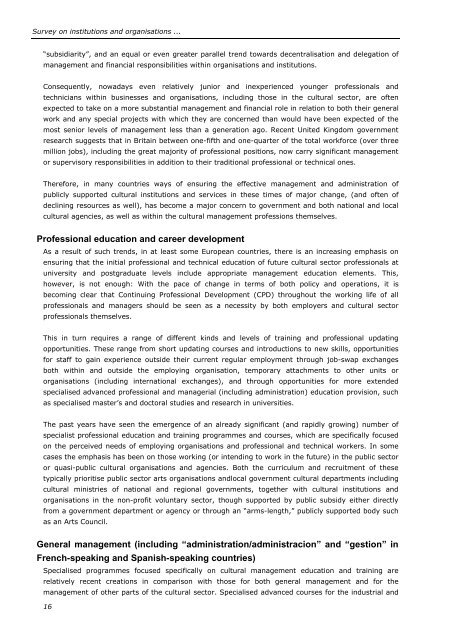Training in cultural policy and management: international ... - Encatc
Training in cultural policy and management: international ... - Encatc
Training in cultural policy and management: international ... - Encatc
Create successful ePaper yourself
Turn your PDF publications into a flip-book with our unique Google optimized e-Paper software.
Survey on <strong>in</strong>stitutions <strong>and</strong> organisations ...<br />
“subsidiarity”, <strong>and</strong> an equal or even greater parallel trend towards decentralisation <strong>and</strong> delegation of<br />
<strong>management</strong> <strong>and</strong> f<strong>in</strong>ancial responsibilities with<strong>in</strong> organisations <strong>and</strong> <strong>in</strong>stitutions.<br />
Consequently, nowadays even relatively junior <strong>and</strong> <strong>in</strong>experienced younger professionals <strong>and</strong><br />
technicians with<strong>in</strong> bus<strong>in</strong>esses <strong>and</strong> organisations, <strong>in</strong>clud<strong>in</strong>g those <strong>in</strong> the <strong>cultural</strong> sector, are often<br />
expected to take on a more substantial <strong>management</strong> <strong>and</strong> f<strong>in</strong>ancial role <strong>in</strong> relation to both their general<br />
work <strong>and</strong> any special projects with which they are concerned than would have been expected of the<br />
most senior levels of <strong>management</strong> less than a generation ago. Recent United K<strong>in</strong>gdom government<br />
research suggests that <strong>in</strong> Brita<strong>in</strong> between one-fifth <strong>and</strong> one-quarter of the total workforce (over three<br />
million jobs), <strong>in</strong>clud<strong>in</strong>g the great majority of professional positions, now carry significant <strong>management</strong><br />
or supervisory responsibilities <strong>in</strong> addition to their traditional professional or technical ones.<br />
Therefore, <strong>in</strong> many countries ways of ensur<strong>in</strong>g the effective <strong>management</strong> <strong>and</strong> adm<strong>in</strong>istration of<br />
publicly supported <strong>cultural</strong> <strong>in</strong>stitutions <strong>and</strong> services <strong>in</strong> these times of major change, (<strong>and</strong> often of<br />
decl<strong>in</strong><strong>in</strong>g resources as well), has become a major concern to government <strong>and</strong> both national <strong>and</strong> local<br />
<strong>cultural</strong> agencies, as well as with<strong>in</strong> the <strong>cultural</strong> <strong>management</strong> professions themselves.<br />
Professional education <strong>and</strong> career development<br />
As a result of such trends, <strong>in</strong> at least some European countries, there is an <strong>in</strong>creas<strong>in</strong>g emphasis on<br />
ensur<strong>in</strong>g that the <strong>in</strong>itial professional <strong>and</strong> technical education of future <strong>cultural</strong> sector professionals at<br />
university <strong>and</strong> postgraduate levels <strong>in</strong>clude appropriate <strong>management</strong> education elements. This,<br />
however, is not enough: With the pace of change <strong>in</strong> terms of both <strong>policy</strong> <strong>and</strong> operations, it is<br />
becom<strong>in</strong>g clear that Cont<strong>in</strong>u<strong>in</strong>g Professional Development (CPD) throughout the work<strong>in</strong>g life of all<br />
professionals <strong>and</strong> managers should be seen as a necessity by both employers <strong>and</strong> <strong>cultural</strong> sector<br />
professionals themselves.<br />
This <strong>in</strong> turn requires a range of different k<strong>in</strong>ds <strong>and</strong> levels of tra<strong>in</strong><strong>in</strong>g <strong>and</strong> professional updat<strong>in</strong>g<br />
opportunities. These range from short updat<strong>in</strong>g courses <strong>and</strong> <strong>in</strong>troductions to new skills, opportunities<br />
for staff to ga<strong>in</strong> experience outside their current regular employment through job-swap exchanges<br />
both with<strong>in</strong> <strong>and</strong> outside the employ<strong>in</strong>g organisation, temporary attachments to other units or<br />
organisations (<strong>in</strong>clud<strong>in</strong>g <strong>in</strong>ternational exchanges), <strong>and</strong> through opportunities for more extended<br />
specialised advanced professional <strong>and</strong> managerial (<strong>in</strong>clud<strong>in</strong>g adm<strong>in</strong>istration) education provision, such<br />
as specialised master’s <strong>and</strong> doctoral studies <strong>and</strong> research <strong>in</strong> universities.<br />
The past years have seen the emergence of an already significant (<strong>and</strong> rapidly grow<strong>in</strong>g) number of<br />
specialist professional education <strong>and</strong> tra<strong>in</strong><strong>in</strong>g programmes <strong>and</strong> courses, which are specifically focused<br />
on the perceived needs of employ<strong>in</strong>g organisations <strong>and</strong> professional <strong>and</strong> technical workers. In some<br />
cases the emphasis has been on those work<strong>in</strong>g (or <strong>in</strong>tend<strong>in</strong>g to work <strong>in</strong> the future) <strong>in</strong> the public sector<br />
or quasi-public <strong>cultural</strong> organisations <strong>and</strong> agencies. Both the curriculum <strong>and</strong> recruitment of these<br />
typically prioritise public sector arts organisations <strong>and</strong>local government <strong>cultural</strong> departments <strong>in</strong>clud<strong>in</strong>g<br />
<strong>cultural</strong> m<strong>in</strong>istries of national <strong>and</strong> regional governments, together with <strong>cultural</strong> <strong>in</strong>stitutions <strong>and</strong><br />
organisations <strong>in</strong> the non-profit voluntary sector, though supported by public subsidy either directly<br />
from a government department or agency or through an “arms-length,” publicly supported body such<br />
as an Arts Council.<br />
General <strong>management</strong> (<strong>in</strong>clud<strong>in</strong>g “adm<strong>in</strong>istration/adm<strong>in</strong>istracion” <strong>and</strong> “gestion” <strong>in</strong><br />
French-speak<strong>in</strong>g <strong>and</strong> Spanish-speak<strong>in</strong>g countries)<br />
Specialised programmes focused specifically on <strong>cultural</strong> <strong>management</strong> education <strong>and</strong> tra<strong>in</strong><strong>in</strong>g are<br />
relatively recent creations <strong>in</strong> comparison with those for both general <strong>management</strong> <strong>and</strong> for the<br />
<strong>management</strong> of other parts of the <strong>cultural</strong> sector. Specialised advanced courses for the <strong>in</strong>dustrial <strong>and</strong><br />
16






